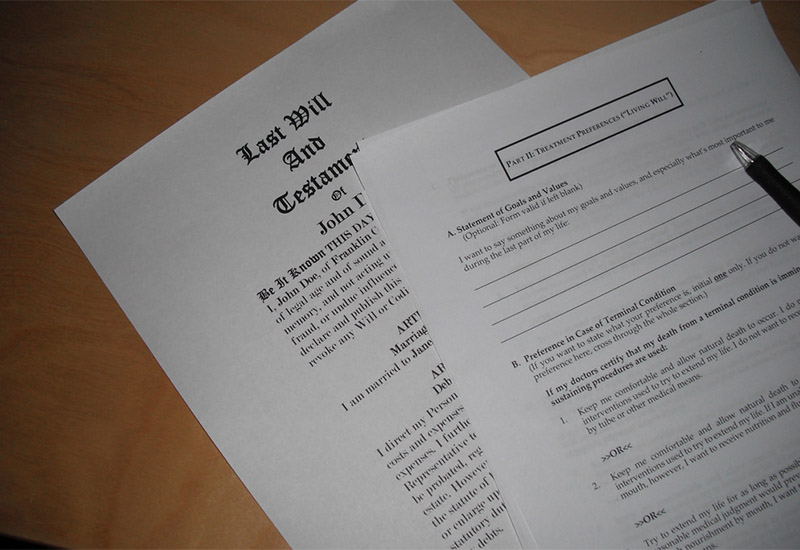Money Matters: Is Your Estate Planning Up To Date?
Editor’s Note: Briant Sikorski from Stratos Wealth Partners in Cary contributed his article.
Cary, NC – One of the first steps you’ll take in the estate planning process is determining how much planning you’ll need to undertake. Two key components of your initial needs evaluation are an estate analysis and a settlement cost analysis.
The estate analysis includes an in-depth review of your present estate-settlement arrangements. This estate analysis will also disclose potential problems in your present plan and provide facts upon which to base decisions concerning alterations in your estate plan.
An estate settlement cost analysis summarizes the costs of various estate distribution arrangements. In estimating these costs, the analysis tests the effectiveness of any proposed estate plan arrangement by varying the estate arrangement, the inflation and date of distribution assumptions, as well as specific personal and charitable bequests.
Remember, estate planning is very complex. And while a simple will may adequately serve the estate planning needs of some people, you should meet with a qualified legal advisor to be sure you are developing a plan that is consistent with your objectives. In addition, be sure to recognize that estate planning is also an ongoing process that may require periodic review to ensure that plans are in concert with your changing goals. Because estate planning often entails many facets of your personal finances, it often involves the coordinated efforts of qualified legal, tax, insurance and financial professionals.
Because you’ve worked hard to create a secure and comfortable lifestyle for your family and loved ones, you’ll want to ensure that you have a sound financial plan that includes trust and estate planning. With some forethought, you may be able to minimize gift and estate taxes and preserve more of your assets for those you care about.
A Needs Evaluation
One of the first steps you’ll take in the estate planning process is determining how much planning you’ll need to undertake. No two situations are alike. And even individuals who don’t have a great deal of wealth require some degree of planning. On the flip side, those with substantial assets often require highly complex estate plans.
Two key components of your initial needs evaluation are an estate analysis and a settlement cost analysis. The estate analysis includes an in-depth review of your present estate-settlement arrangements. This estate analysis will also disclose potential problems in your present plan and provide facts upon which to base decisions concerning alterations in your estate plan.
For example, you may believe that your current arrangements are all taken care of in a will that leaves everything to your spouse. However, if you’ve named anyone else as a beneficiary on other documents – life insurance policies, retirement or pension plans, joint property deeds – those instructions, not your will, are going to govern the disposition of those assets. You want to ensure that all your instructions work harmoniously to follow your exact wishes.
In addition, you may want to consider alternative asset ownership arrangements under certain circumstances. An estate plan that leaves everything to a surviving spouse enjoys the unlimited marital deduction against all estate taxes but fails to take advantage of the decedent spouse’s applicable exclusion amounts against estate taxes under federal and state law. This may result in a larger estate tax burden at the death of the second spouse. Yet these are taxes that can potentially be minimized with careful estate planning.
While your spouse will receive your estate free of estate taxes if he or she is a U.S. citizen, anything your spouse receives above his or her federal applicable exclusion amount may eventually be subject to estate taxes upon his or her death.1 Many states also have their own estate tax regimes and apply different (lower) estate tax applicable exclusion amounts, which you will need to consider with your estate planning professional.
An estate settlement cost analysis summarizes the costs of various estate distribution arrangements. In estimating these costs, the analysis tests the effectiveness of any proposed estate plan arrangement by varying the estate arrangement, the inflation and date of distribution assumptions, as well as specific personal and charitable bequests.
Estate planning is very complex. And while a simple will may adequately serve the estate planning needs of some people, you should meet with a qualified legal advisor to be sure you are developing a plan that is consistent with your objectives.
Finally, be sure to recognize that estate planning is also an ongoing process that may require periodic review to ensure that plans are in concert with your changing goals. In addition, because estate planning often entails many facets of your personal finances, it often involves the coordinated efforts of qualified legal, tax, insurance and financial professionals.
Estate Planning Checklist
Bring this checklist to a qualified legal professional to discuss how to make your plan comprehensive and up-to-date.
Part 1 – Communicating Your Wishes
Part 3 – Reducing Your Taxes
Part 4 – Protecting Your Business
|
Points to Remember
- A plan helps to determine the most advantageous means of owning family properties.
- Planning may help minimize estate and income taxes, administrative expenses, executor’s commissions and attorney’s fees.
- Your plan may help to provide adequate income to your survivors.
- By planning, you can preserve the assets you have worked hard to accumulate.
- An estate plan can help provide funds for debt repayment, if desired, and educational expenses.
- An estate plan can help provide adequate and available money to meet known and anticipated settlement expenses upon your death.
- Estate planning often involves the coordinated efforts of qualified legal, tax, insurance and financial professionals.
1The estate tax exemption is $5.43 million for 2015, with a top tax rate of 40 percent.
Briant Sikorski is a Wealth Advisor at Stratos Wealth Partners. Photos by Chris Potter, Ken Mayer and reynermedia.






